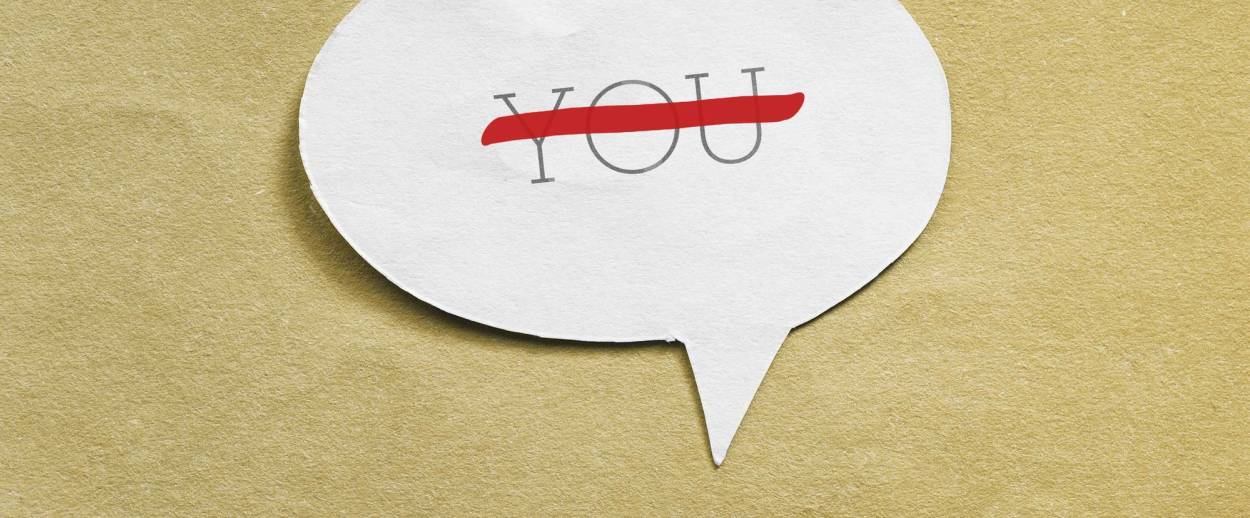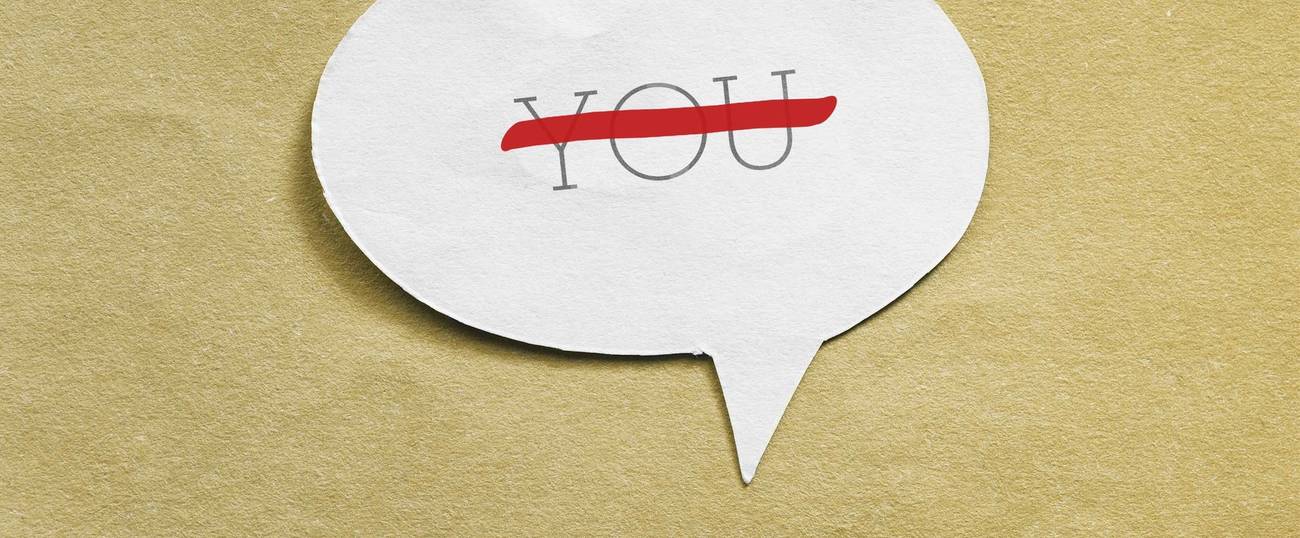And How Are We Tonight, President Trump?
Bad faith, political speech, and the intrusive ‘we’




The couple were typical Palm Beach: 65 or so, WASP-y, dressed up. They were in their Cadillac outside a popular restaurant, waiting for the valet, as I crossed the street. Behind me, a young male voice sang out, “Hello! Hello!” I turned to see the valet rushing over to the car. He was in his mid-20s, blandly attractive, in the Palm Beach service uniform of khaki trousers and pastel polo shirt. Maybe a college kid. “Stay right there,” he told the driver. And then, closer to the car, his voice turned unctuous, and he oozed, “And how are we tonight?”
If I were the driver, I told myself, I’d answer, “I have no idea how you are, or why you’re referring to yourself in the plural.” But it’s churlish to get angry at a service person for a phrase he might not even be aware is offensive.
This use of “we” is one of the phrases I dislike most in the world, along with the even more annoying “And are we finished with that yet?” which the couple in the car were probably going to hear in an hour or two. As I walked away it struck me that these intrusive “we’s” are becoming more common, which is a symptom of something. But what?
Then it hit me: this “we” is like Sartre’s famous remarks in Being and Nothingness on bad faith: The waiter who performs his waiting in such an exaggerated manner that he denies his freedom and embraces an inauthentic identity as merely a waiter. Yet, there’s a twist to Sartre’s idea. The waiter’s exaggerated behavior also is so obviously role-playing that it makes it clear to the world and to himself that he is not only a waiter. He’s a complex human being playing at being a waiter!
But Sartre’s 1943 analysis stemmed from a still-class-bound, hierarchical European milieu. Then as now, most French waiters were salaried, career employees, not actors supporting themselves between auditions. The “we’s” of American service providers are more complicated.
On the one hand, this “we” is an attempted leveling of a presumed social barrier, for example, between car-parker at a restaurant and diner. Yet, in the United States this barrier is likely to be temporary; being a parking valet is usually an interim job for a young man, not a lifelong trap. The Palm Beach valet had the look of someone with country-club parents, someone used to tossing the keys to the valet himself.
Still, we don’t use the intrusive “we” with our friends (“Will we be having another beer?”) or in business situations. (“And will we be interviewing for the junior-brand-manager position today?”) Unlike that recent college grad interviewing for the junior-brand-manager position, the parking valet is both embracing an identity he’d rather not have and making it clear that he knows it’s just temporary. Waiters in the United States are usually part-timers who are pursuing college or artistic careers—people who definitely don’t consider their description to be “waiter,” but who want to do a good job so they get big tips. They are, for want of a better term, alienated yet motivated labor.
Health care is the service business in which the intrusive “we” is most sinister. Hospital staff often include it in their saccharine talk with patients (“And how are we doing with the new medication?”). I remember it from my mother’s dying days in hospitals. And I always think that question deserves an answer like, “We are probably going to die quite soon,” or “we feel like vomiting,” but when you’re very sick or frail, you can’t afford to annoy the nurses, can you?
The intrusive “we” is absent not only from nonservice businesses but from those parts of the service sector in which many people embrace their work identities, like art galleries and retail banking. Can you imagine, “And are we interested in the small Picasso?” or “And are we thinking about a loan?” Nor is this “we” used in clothing stores (“Are we interested in trying on the Alaia?”). A saleswoman in a chic store may be condescending to a customer the saleswoman dislikes, but the clerk considers herself an equal to her customer, perhaps even superior.
Expressions like “How are we tonight?” are passive-aggressive, even narcissistic. The speaker doesn’t really care how the customer is; he really cares how the customer thinks he’s doing his job. His “How are we tonight?” is really, “How do you think I’m doing? Will I get a good tip?” (hospital staff don’t get tip income). A writer friend drew my attention to the reverse phenomenon of people using the first-person singular when they should be using the first-person plural, like employees of corporations saying, “My truck will deliver it tomorrow morning,” or waiters saying, “I have lobster.” I’ve heard it on embeds in the Army, too: A supply sergeant says, “I have two trucks going to Mandozai at 16:00.” My friend finds this turn of phrase annoying; I don’t. It isn’t passive-aggressive; it’s pretty straightforward, even touching, identification with the institution you work for, unearned or not.
The closest idiom to the intrusive “we” is an expression that also tries to reel you inside someone else’s personal boundaries: “I need you to.” I first heard it while embedded in U.S. military units in Afghanistan as a journalist: “I need you to put on your body armor now” or “I need you to leave your cellphone here.” The speaker is really telling me to do these things, not asking, but he’s trying to phrase it so that I will think I’m helping him rather than obeying him. In other words, the rules say that I need my body armor in this area, he’s just the one who happens to be reminding me of that, but it’s on him if I don’t wear it and somehow get blown up, so I’m being helpful if I follow the rules.
“How are we” and “I need you to” share evasiveness, passive aggression, and even a veiled threat. They’re good-boy expressions that suggest there’s an angry boy just underneath. They are even, dare I say, micro-aggressions. I suspect they have something to do with the fact that Americans have now elected two unqualified, massively self-struck individuals as president back-to-back. (Trump is a reaction to Obama, but a reaction that is, as Lee Smith has argued in Tablet, part of the same illness, not a cure for it.)
The ressentiment comes from the perception that the doors of opportunity are closing for many Americans and from anxiety about the future—the same emotions that Obama was unable to address, and instead often goosed. The only social climbing that’s easy now is done with words: I lift myself up by putting you down. So we intrude on each other’s personal space in these tiny ways.
Meanwhile, our public speech becomes degraded into the languages of whining, empty boasts and hucksterism. Donald Trump’s use of the third person in referring to himself (“Thanks, Donald!” in a Dec. 28 tweet, to name just one of many) and his notorious love of ALL-CAPS in his tweets are examples. But it didn’t begin with the Trump campaign.
Maybe the most egregious example of distorted grammar in recent political speech came from Obama, an accomplished writer who is sensitive to the uses and valences of language. Consider the illogical, deceptive and passive-aggressive “we” of the famous 2008 Obama speech: “We are the ones we’ve been waiting for. We are the change that we seek.”
Obama’s “we” goes past the familiar exhortatory “we” of political speeches (“We here highly resolve that these dead…”) in which a politician claims to or hopes that he speaks for a crowd or group. Lincoln hoped that other Americans felt what he did at Gettysburg, that there was a “we” out there who shared his high opinion of America. Obama, on the other hand, hoped that other Americans shared his fine opinion of himself.
In that phrase from his speech, Obama’s first “we” is really an “I,” and his second “we” is really a “you.” As in, “I am the one you’ve been waiting for. I am the change that you seek.” Just as the parking valet thinks he is the one you’ve been waiting for—in fact, he is almost you.
Some might argue that the grammatical distortion in this “we” is no more annoying than that of certain languages’ use of the third-person singular as a respectful term of address; for example, the Italian “lei,” old-fashioned now: “Lei e molto gentile” or “He is very kind” to mean “you are very kind.” In Portuguese, it’s more polite to say the equivalent of “the sir” (O Senhor) than the formal you (“voce”). But that’s a distancing mechanism, not an intrusion. It elevates the person addressed into a sphere above the speaker rather than breaking into his sphere and claiming to share it.
There’s something scarier lurking beneath all these “we’s” and “yous.” A Democratic member of the House, Rep. Steve Cohen of Tennessee, recently saw it. He made the acute observation that Trump reminds him of the late Fidel Castro. They shared egocentric personality traits, affection for Russia—and a love of talking for long stretches. “Castro needed to be the center of attention at all times,” Cohen said.
Cohen is onto something I’ve seen firsthand in Iraq and in Libya: how dictators impose cults of personality that colonize huge tracts of the headspace of their subjects, so much space that citizenship, which entails the public and mutual recognition of equal persons, is replaced by a private, imagined relationship with the leader, which is reinforced through propaganda and mass spectacle. After the 2011 revolution, many Libyans talked about getting rid of the “little Gadhafi” in their heads. (As we’ve seen, it takes time.) Let’s hope Americans aren’t going the same route.
***
You can help support Tablet’s unique brand of Jewish journalism. Click here to donate today.
Ann Marlowe, a visiting fellow at the Hudson Institute, is a writer and financial investigator in New York. She is the author of How to Stop Time. Her Twitter feed is at @annmarlowe.